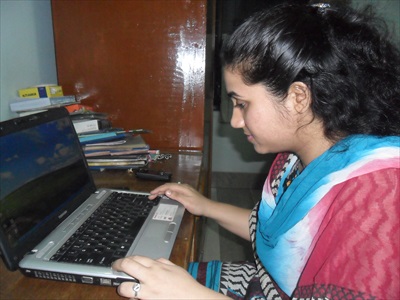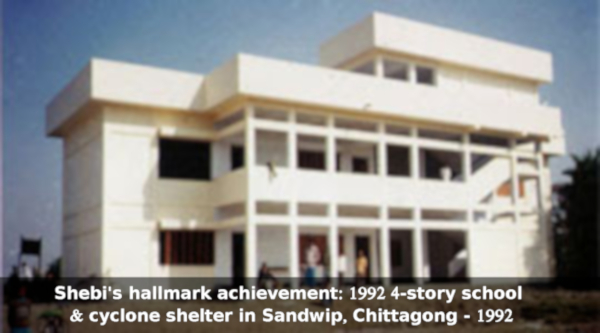Meeting Another Helen Keller
By Farhana Islam
They say beauty lies in the eyes of the beholder, but I do not agree. I believe beauty lies in the heart of the beholder as we sometimes fail to see the beauty around us. Do we actually need eyes to dream and to live those dreams? The answer is "no" and the biggest example is my friend, Seema Iqbal.
It was just another day of a tiring class when I noticed a girl sitting in the front, answering all the questions confidently. I watched her closely, and noticed that she was discussing the difficult case laws and acts from memory, without the aid of lecture notes like the rest of us. I was amazed by her brilliance. The word "Seema" in Bengali means "limit" or "boundary," but Seema was a contradiction to her name.

Seema was born a healthy baby, but over time her vision began to deteriorate. At age 5, her father brought her to one of the world's best hospitals, the National Hospital of Singapore. There, the doctors informed her father that the deterioration of her eyesight could not be reversed. There was no treatment available. Several years passed and at about 10 years old, Seema lost her eyesight.
Despite her limitations, Seema surprised her parents with her enthusiasm and interest in education. However, she faced constant discrimination at school, to a point that she could no longer bare to attend. Seema had a small group of people supporting her, which included her loving parents and a few friends, but felt that her battle to make achievements in life is one that she would largely face alone. Seema was determined to show the world being blind doesn't mean that she doesn't exist. With the help of her cousin, Seema installed a screen reader software, which helped her to read, work in MS Office, and also access the internet. She then went to an institution in Shewrapara, Mirpur which trained blind people in computing, and then attended the Institute of Hazrat Mohammad (SAW) for five months.
In 2007, the learned that disabled students could take exams abroad through the British Council, which is available worldwide. Seema went to British Council, but was rejected because they did not have provisions for the blind. She was extremely disappointed, but knew that she would need to be persistent. She continued to contact the British Council and then finally, on 10 December, 2007, Seema received an email allowing her to take the exam once special arrangements could be made. She used this time diligently to prepare, and felt very anxious about taking the exam. In the end she excelled in the O level exams. She received an 'A', which ended up being a turning point in her life.

Crossing this hurdle fueled her determination and gave her the mental strength to pursue a degree in law. She decided to be the first blind student to pursue British Law in Bangladesh through a Diploma of Law program. Seema is now in her third year of law school, and has overcome huge amounts of adversity to get to where she is. She is a role model to those with who are overcoming disability.
I had the opportunity to interview her and learn from her insights. An excerpt from the interview is below:
How do you deal with your success?
"I am happy, feel proud and good about myself because after so much of struggle I achieved this. But I am just a normal human being and won't be so proud because God can take away anything at any moment."
What do your parents mean to you?
"God has not given me eyes but my parents are my both eyes. One is my father and one is my mother. For example if we go in a restaurant, my father reads out from the menu loud, wants to know what I prefer. He takes my opinion and makes me feel I am important. My suggestions, my views, my advice matter to him. I matter to him. My mother is completely dependent on me. You saw her how emotional she is, always crying. She suffers from indecision so for each and everything she asks for my opinion. She is nothing without me. My suggestion is valuable for her."
Is disability a problem?
"This is a blessing gifted by God to us as we are special, not a problem. It is the problem of our society. I agree doors are not open for us. But we have to come out, open doors for ourselves. If normal people want to go anywhere they can go, if they want to do anything they can, there is no restriction. We have a problem, we have to face obstacles, we have to overcome our problems by taking them as challenges. Be confident. Be brave. Believe in yourself and God. There is nothing which is impossible for us."
What is your advice to the parents of disabled children?
"A little encouragement, a little personal attention, a little love and care can make a big difference in our lives. We are not a burden. We just want your support, our siblings' support, friend's support. A little bit of support can take us to a long way and an example is in front of you."
What advice will you give to disabled children who want to study law like you?
"Definitely, come and if you face any problem I am here to help you. Believe me nothing is impossible. Just believe in yourself and a bright future is waiting ahead to accept you with open arms!"
When asked what are your future plans?
"I want to enforce and implement rights. We do not have strong law in this area. Once the law is enforced, society will be bound to accept them. Providing laptop, training, sufficient time during examination for these children. The system must change. I believe only then can I make change in our country. It is very important to know the law so that we can bring actions against injustice. I want to work in this sector and open an English medium school for the blind as English is a very important medium of communication in today's world."
Meeting with Seema was a wonderful experience for me. Like from Helen Keller, the world has so much to learn from her. Seema was isolated in the darkness of her own existence, trapped by her inability to see, but still did not give up her fight.
No matter how many problems she faced, she had the strength and determination to deal with them. As she says – if there is a will there is a way.



